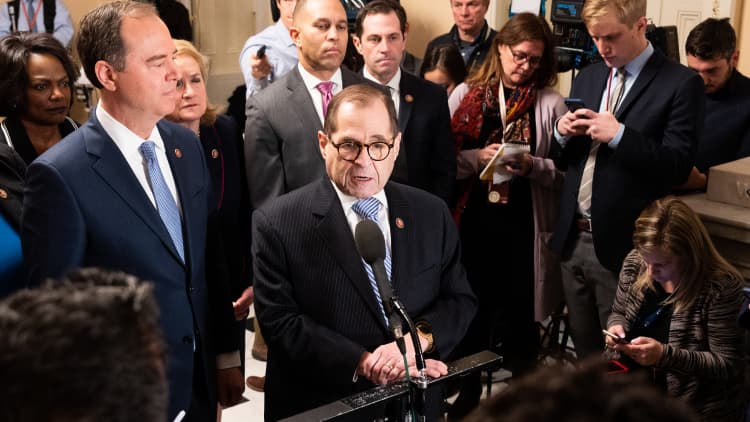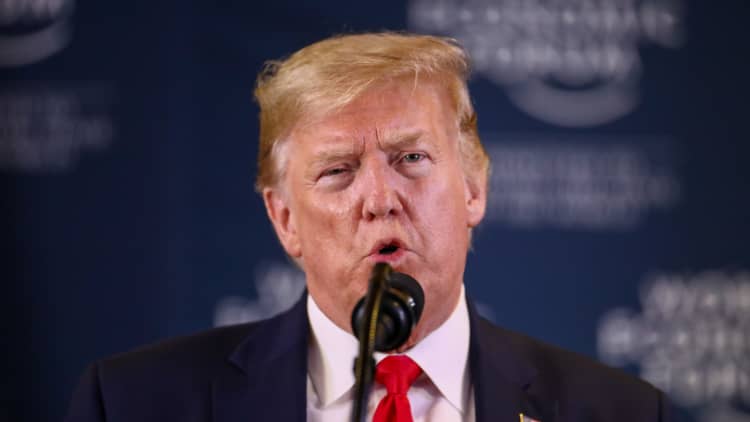
President Donald Trump called House impeachment manager Jerry Nadler "a sleazebag" on Wednesday, hours before he and fellow Democrats were to begin laying out their case in the Senate for Trump's conviction and removal from office.
Capping a tension-filled day, Chief Justice John Roberts, who is presiding over the trial, interjected in the debate early Wednesday to admonish both sides for their harsh language. But hours later at the World Economic Forum in Davos, Switzerland, Trump unloaded on Nadler.
In response to a question about the New York Democratic, who heads the House Judiciary Committee, Trump said: "I've known him a long time. He's a sleazebag. Everyone knows that."
The next stage in the trial is set to begin at 1 p.m. ET. In the early hours of Wednesday, the Republican-majority chamber voted along party lines to adopt a resolution from Senate Majority Leader Mitch McConnell, R-Ky., laying out the rules for the proceedings.

McConnell claimed that his guidelines mirrored the bipartisan rules that were followed in former President Bill Clinton's 1998 impeachment trial.
But the House managers and Senate Minority Leader Chuck Schumer, D-N.Y., strenuously objected to key parts of the resolution — some of which departed from Clinton's precedent — arguing that they would result in a rushed trial without proper assurances that salient evidence and witnesses will be heard.
McConnell did make concessions to his proposal from Monday evening, however. As the resolution was read aloud on the Senate floor, it was revealed that the rules will permit each side to stretch out the 24 total hours they've been allotted for making arguments over three days, instead of the original two. The changes will also automatically admit into evidence the entire record of the House impeachment probe into Trump last fall.
The majority leader's proposal passed the Senate in a 53-47 vote in the middle of the night, following more than 12 hours of at-times vicious debate on the Senate floor between House managers and Trump's defense team over a series of amendments put forward by Schumer.
In remarks early Wednesday, Nadler addressed the Republican senators in the chamber directly.
"Will you permit us to present you with the entire record of the president's misconduct? Or will you instead choose to be complicit in the president's coverup?" he asked. "So far, I'm sad to say I see a lot of senators voting for a coverup, voting to deny witnesses, an absolutely indefensible vote, obviously a treacherous vote."
Trump lawyer Pat Cipollone responded: "Mr. Nadler, you owe an apology to the president of the United States and his family, you owe an apology to the Senate, but most of all you owe an apology to the American people."
Shortly after that exchange, Roberts chimed in.

"I think it is appropriate at this point for me to admonish both the House managers and the president's counsel in equal terms to remember that they are addressing the world's greatest deliberative body," Roberts said.
"One reason it has earned that title is because its members avoid speaking in a manner and using language that is not conducive to civil discourse."
The 11 amendments included changes that would have allowed subpoenas to be issued for documents from the State Department and the Office of Management and Budget. They also would have led to subpoenas for testimony from key Trump administration officials such as former national security advisor John Bolton and White House chief of staff Mick Mulvaney, who were not interviewed during the House impeachment inquiry.
But all of the amendments were essentially shot down, and nearly all of the votes fell along party lines in the Senate, 53-47.
On only one vote did a Republican — Sen. Susan Collins of Maine — join the Democrats. That vote would have allowed additional time to file responses to trial motions.
At one point, McConnell asked Schumer to stack the remaining amendments. Schumer refused, saying the votes are "extremely significant and important to the country," but suggested that some of the votes could be put off until the next day.
McConnell refused to delay the votes, leading the Democrats to continue debate with the president's legal team over the amendments until nearly 2 a.m.
Trump was impeached by the House on Dec. 18 on articles of abuse of power and obstruction of Congress. Both articles relate to his efforts to pressure Ukraine President Volodymyr Zelenskiy into announcing probes involving his political opponent, former Vice President Joe Biden, and then blocking attempts from Congress to investigate.
It is considered highly unlikely that two thirds of the GOP-majority Senate will vote to remove a Republican president.


